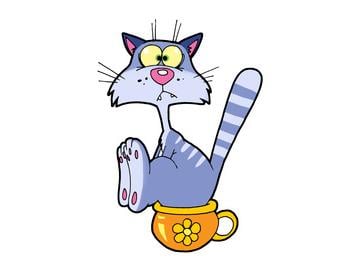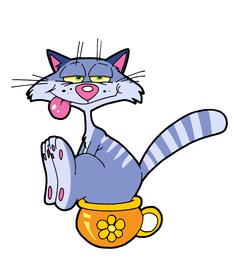
Diarrhea is quite common in people and not so rare in pet animals too. But is it something to worry about? Yes, it is. Diarrhea is one of the most common signs of intestinal disorder in dogs and cats and, like with any sudden changes, diarrhea or even softening of stools should be paid attention to, if not warrant a vet visit.
Diarrhea in cats is an abnormal liquidity and increased frequency of fecal discharges. There can be two types: acute diarrhea (if it occurs only once or a few times within a short period), or chronic diarrhea, which is commonly understood as frequently recurring diarrhea for a period longer than three weeks.
IMPORTANT: Diarrhea is usually associated with a large amount of fluid loss and dehydration in cats. If diarrhea persists for more than 24 hours, veterinary assistance is necessary to not only find a cause but also to restore your cat’s hydration.
Causes of diarrhea in cats
In order to treat diarrhea, it’s necessary to find its cause. In many cases, acute and chronic diarrhea may have similar causes. If your cat is suffering from acute diarrhea, you should look for something that has changed recently; with chronic diarrhea, a closer examination and tests may be necessary.
Possible causes of acute diarrhea in cats
- Virus infections. Many viruses have diarrhea as one of the first signs. Most common in cats are panleukopenia, coronavirus, and rota-virus. To suspect a virus infection, you should look for additional signs, such as vomiting, loss of appetite, dehydration, fever, decreased activity, and “bad mood.” If you see any of these signs, visit a veterinarian immediately as this is an emergency.
- Bacterial infections. Bacterial infections, such as Salmonella, Clostridium, E. coli, and others, are common causes of diarrhea in cats. Signs can be similar to viral infections, with loss of appetite and vomiting being the most common. Visit a veterinarian as soon as possible.
- Internal parasites. Parasites such as hookworms are among the most common causes of diarrhea in cats. Related signs to look for are blood in stools, pale gums, skin irritation, and worms in feces. See a list of worm symptoms in cats here. If a parasite invasion causes diarrhea, it’s necessary to rid your cat from them according to your veterinarian’s guidelines. Also, it’s not a bad idea deworm other pets and yourself simultaneously.
- New food introductions. Introducing new food too quickly can cause diarrhea, vomiting, and loss of appetite due to a gastrointestinal upset. In such cases, it may be falsely assumed that the food is bad, while in reality it’s just introduced too fast. In this case, switch back to a previous diet and carry on with a gradual introduction of the new cat food.
- Foreign material ingestion. Ingestion of foreign material may block a cat’s intestinal system, and the body can respond with diarrhea. If you suspect that your cat has ingested a foreign body, visit your veterinarian immediately.
- Spoiled cat food. While more prevalent in cats eating a homemade diet or table scraps, fats in dry food may also become spoiled and cause diarrhea in cats and dogs.
- Drugs. Many drugs, including antibiotics and anti-cancer drugs, can cause diarrhea in cats. If you give your cat a certain drug, check the instructions for possible side effects and consult a veterinarian in case of drug-induced diarrhea.
- Overeating. As with humans, overeating can cause diarrhea, vomiting, loss of appetite, and inactivity.
- Other medical conditions. The most common conditions that can cause diarrhea in cats are gastrointestinal, liver, and renal diseases. Always consult a veterinarian if you are not able to identify and eliminate the cause of acute diarrhea.
Possible causes of chronic diarrhea
We won’t talk about possible causes of chronic diarrhea in detail. If your cat is suffering from chronic diarrhea, a vet visit is a must. Cats lose a lot of fluid during diarrhea, which cannot be replaced through drinking; administration of fluids, as well as determining and treating the cause, is a must.
The most common causes of chronic diarrhea in cats are inflammatory bowel disease, neoplasia, parasites, metabolic diseases, bacterial and viral infections, malfunctions in the digestive system, diet changes, allergies resulting from a constant poor-quality diet, and others, including most causes mentioned for acute diarrhea.
Treatment of diarrhea in cats
 Visit a veterinarian. Even if you decide to identify the cause and treat your cat’s diarrhea on your own, a vet visit is a must if the problem still persists for more than 24 hours.
Visit a veterinarian. Even if you decide to identify the cause and treat your cat’s diarrhea on your own, a vet visit is a must if the problem still persists for more than 24 hours.- Find the underlying cause of diarrhea with the help of your veterinarian. Often, the cause of diarrhea in cats is easily recognizable and little to no additional treatment is necessary; however, if there is no apparent cause of diarrhea, additional tests, such as blood count and analysis of fecal samples, may be necessary.
- Fluid administration will be done orally, as injections under the skin, or as an intravenous therapy. Your veterinarian will help you determine the severity of your cat’s dehydration and the amount of fluids necessary to administer.
- Restrict food intake for a day and then gradually resume to a normal intake. Do this only if your veterinarian suggests so.
- Temporarily modify the diet. Your veterinarian will likely recommend modifying your cat’s diet for a short period of time. So what should you feed a cat with diarrhea? In order to let your cat’s digestive system recover and rebuild its micro-fauna, a bland diet should be considered. This usually includes some combination of meat and rice, such as cooked chicken breast and boiled rice. You can also use a prescribed diet intended for cats with diarrhea or consult a veterinarian for better feeding options. There is no single best cat food for diarrhea treatment, but good examples include lean meat (for example, chicken breast or ground beef) combined with boiled rice, pasta, or potato.
- Switch back to a normal cat diet if the diarrhea ceases within three to five days. If not, visit your veterinarian again. The normal diet is either your cat’s previous diet or, if the diarrhea was related to improper diet, a new, cat-appropriate diet. You can see our article to learn what to look for in a good cat food, as well as talk to your veterinarian about the possible choices. Remember that switching back to a normal diet should be done gradually; that is, keep feeding the bland diet but introduce a small amount of the new food and gradually increase the amount of the new food. Check here to see how a new food should be introduced to a cat to avoid vomiting, lack of appetite, and recurrence of diarrhea.
Diarrhea is common in cats an dogs, as it is common in humans. If you are able to identify the cause and the diarrhea resolves within 24 hours, you are good to go; however, in any case, diarrhea in cats is a good reason to visit a veterinarian.
